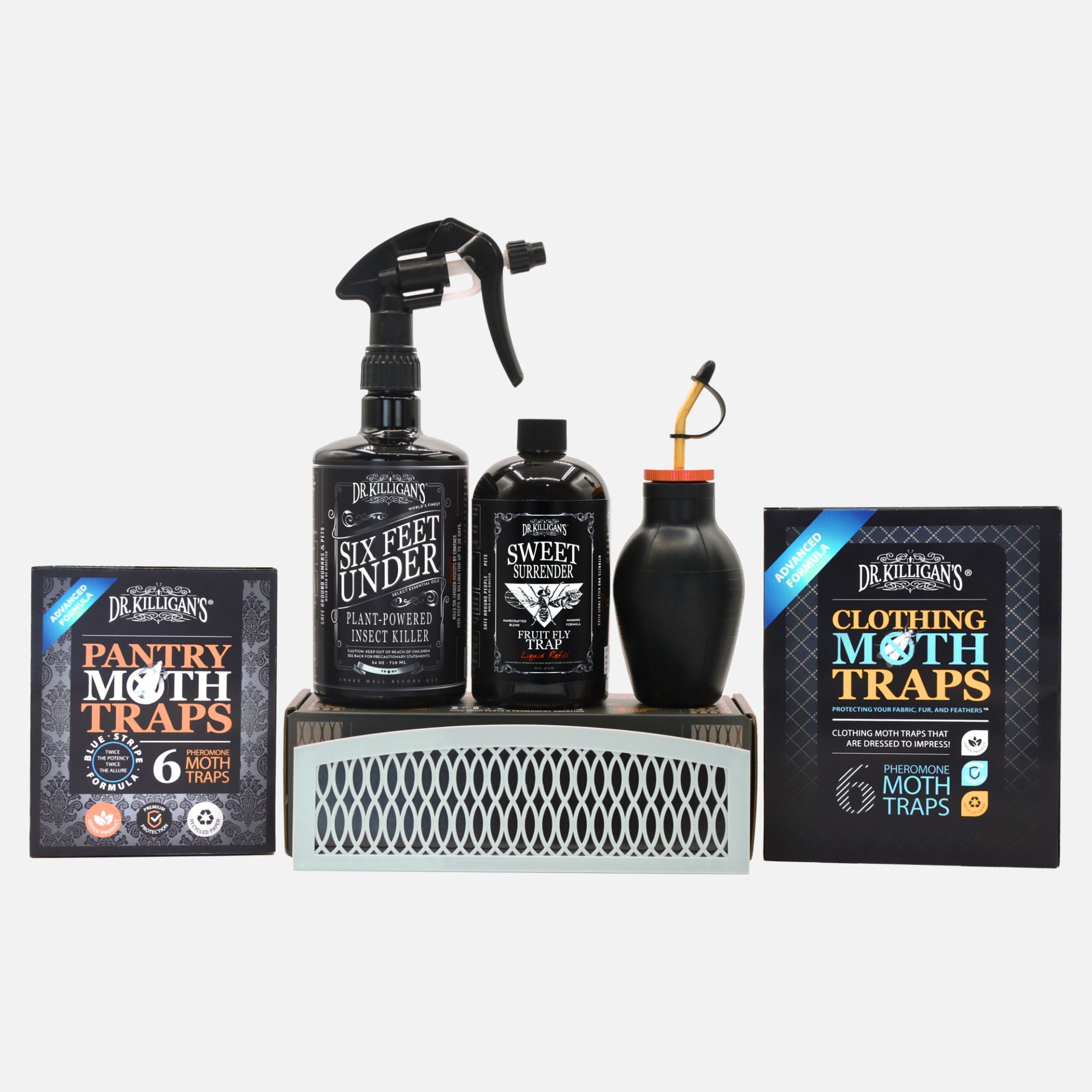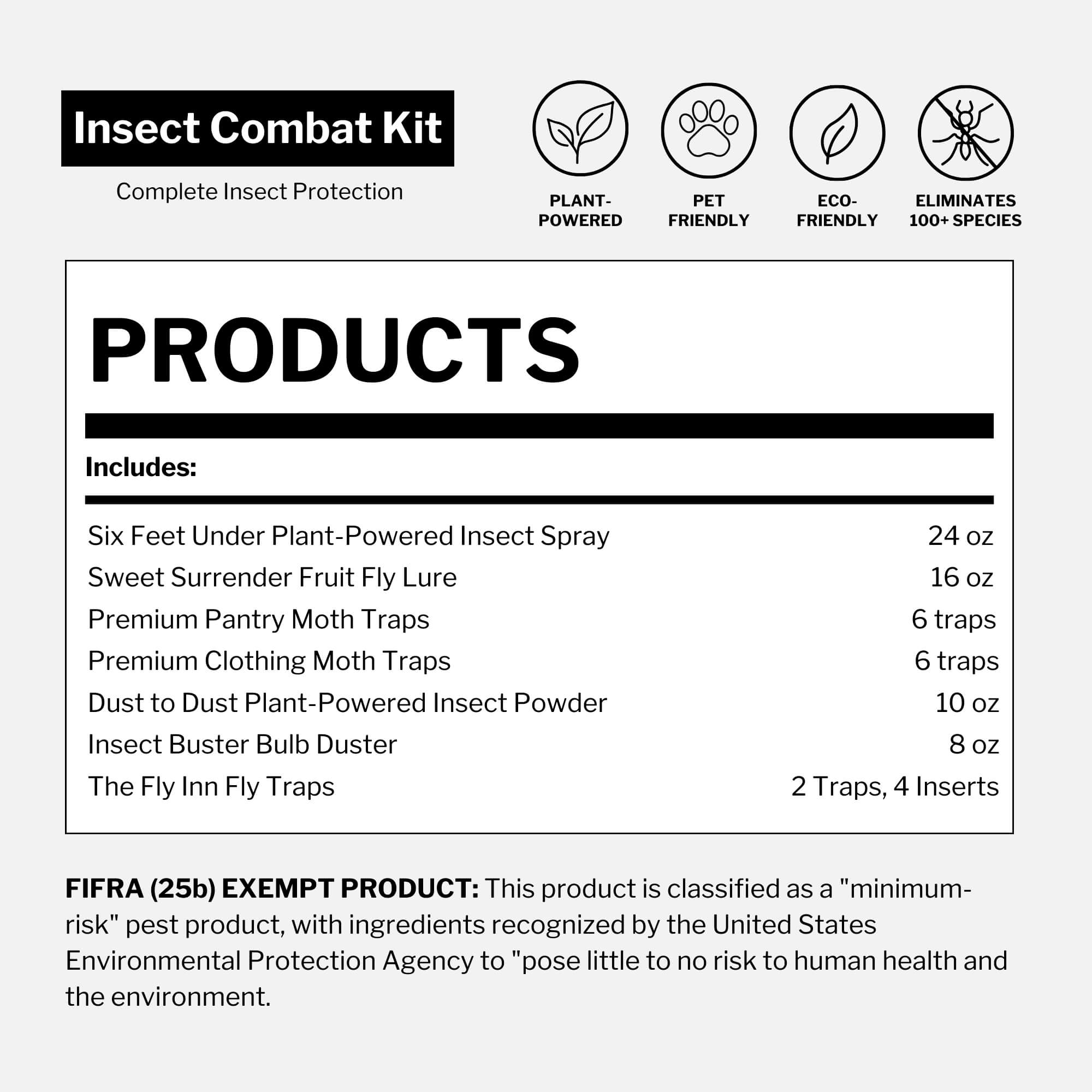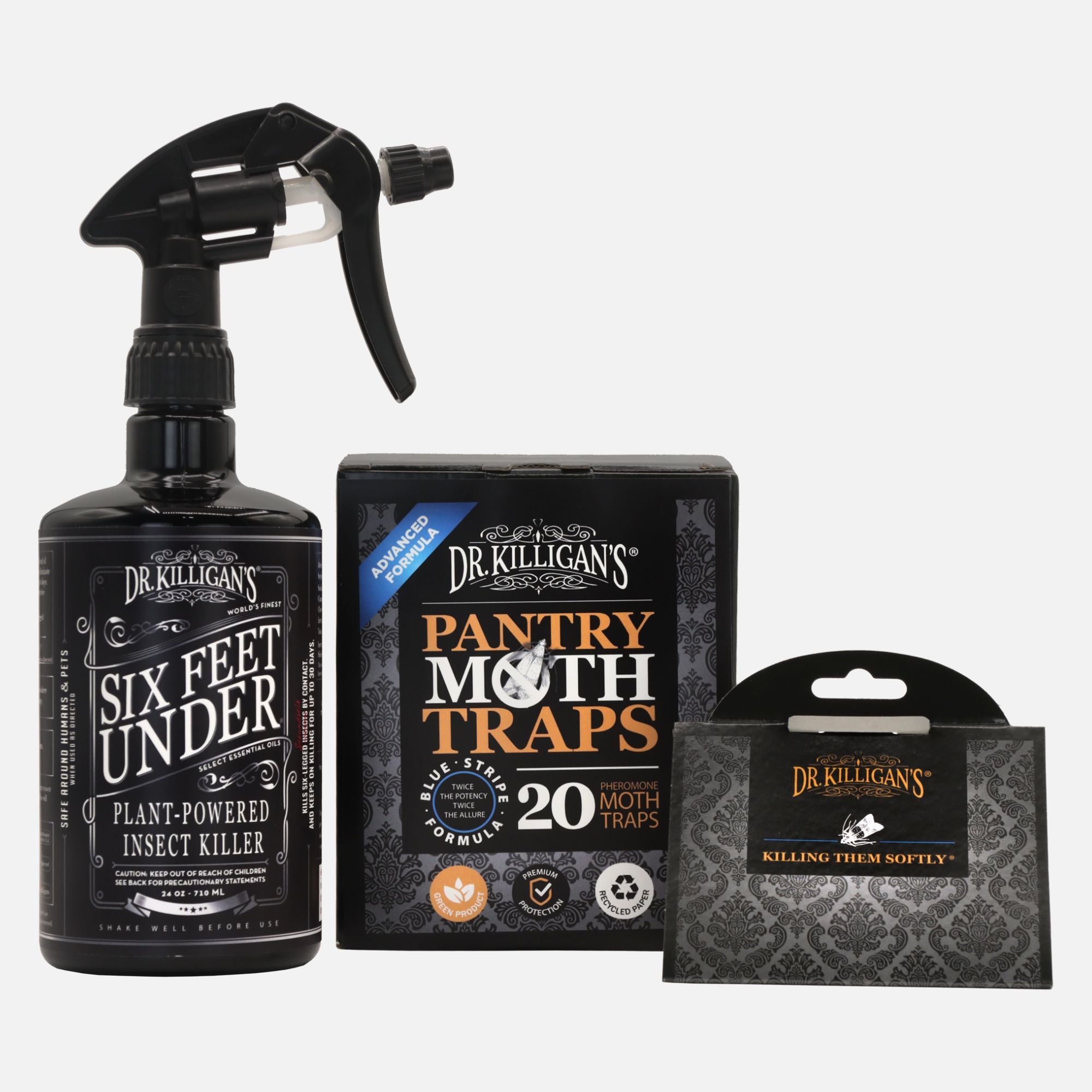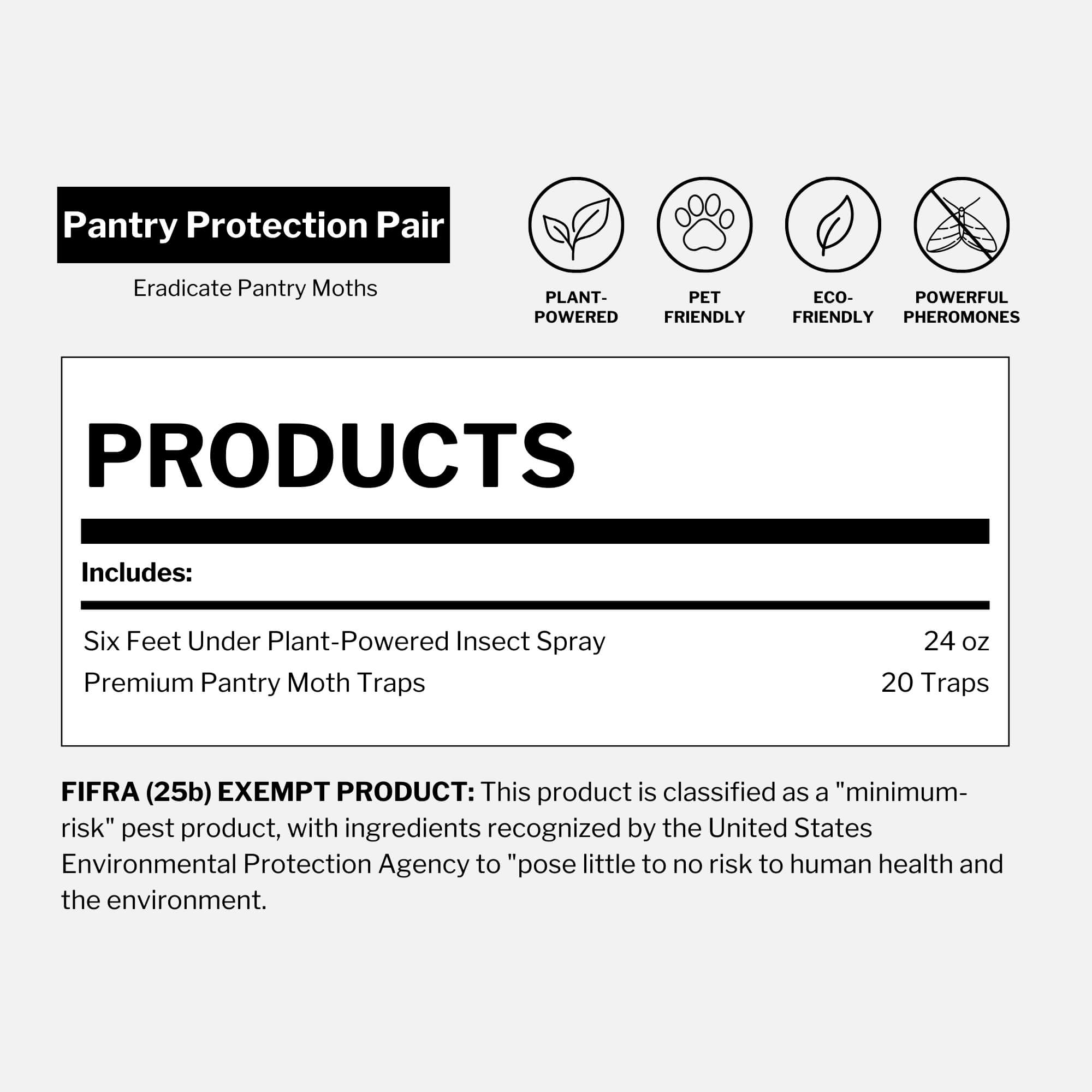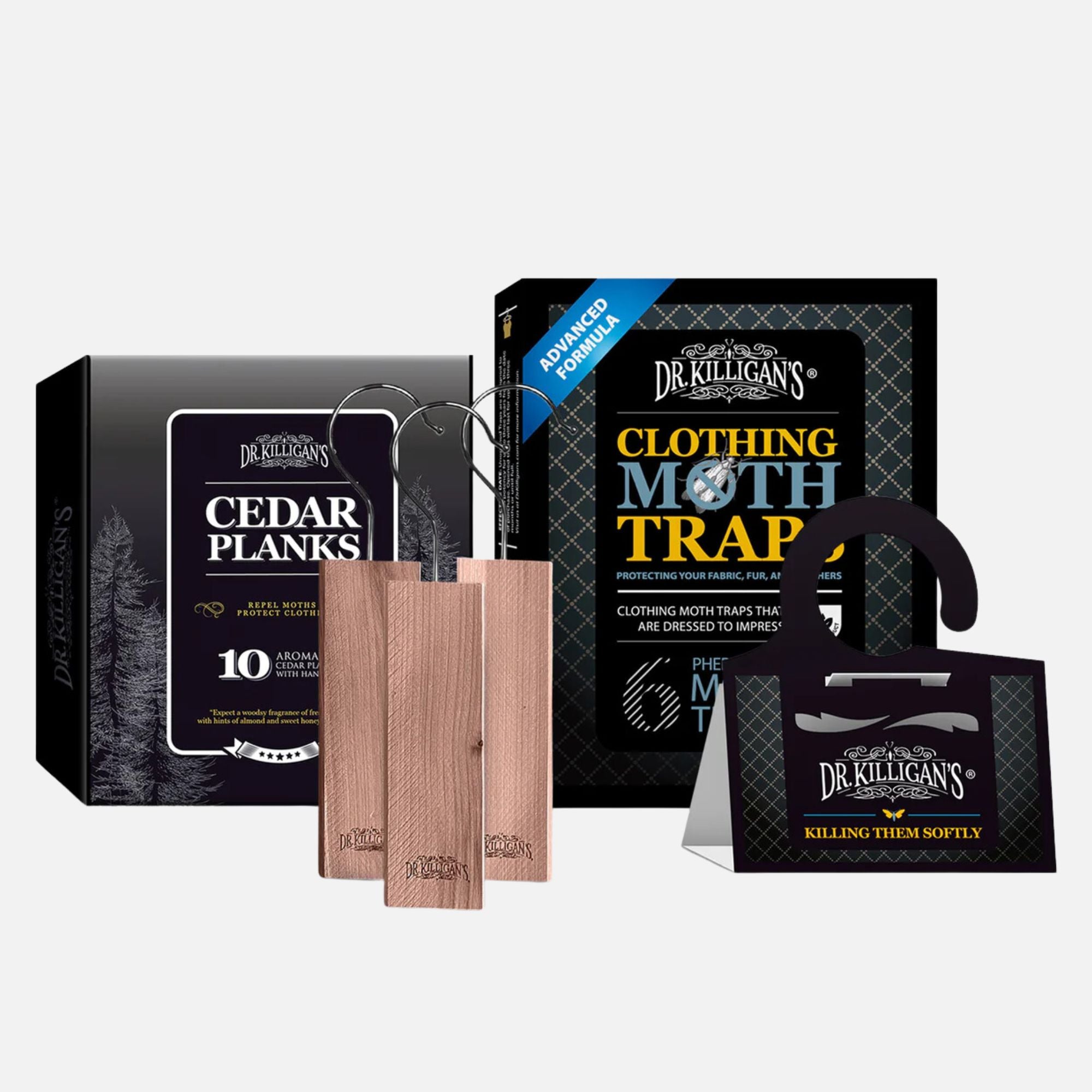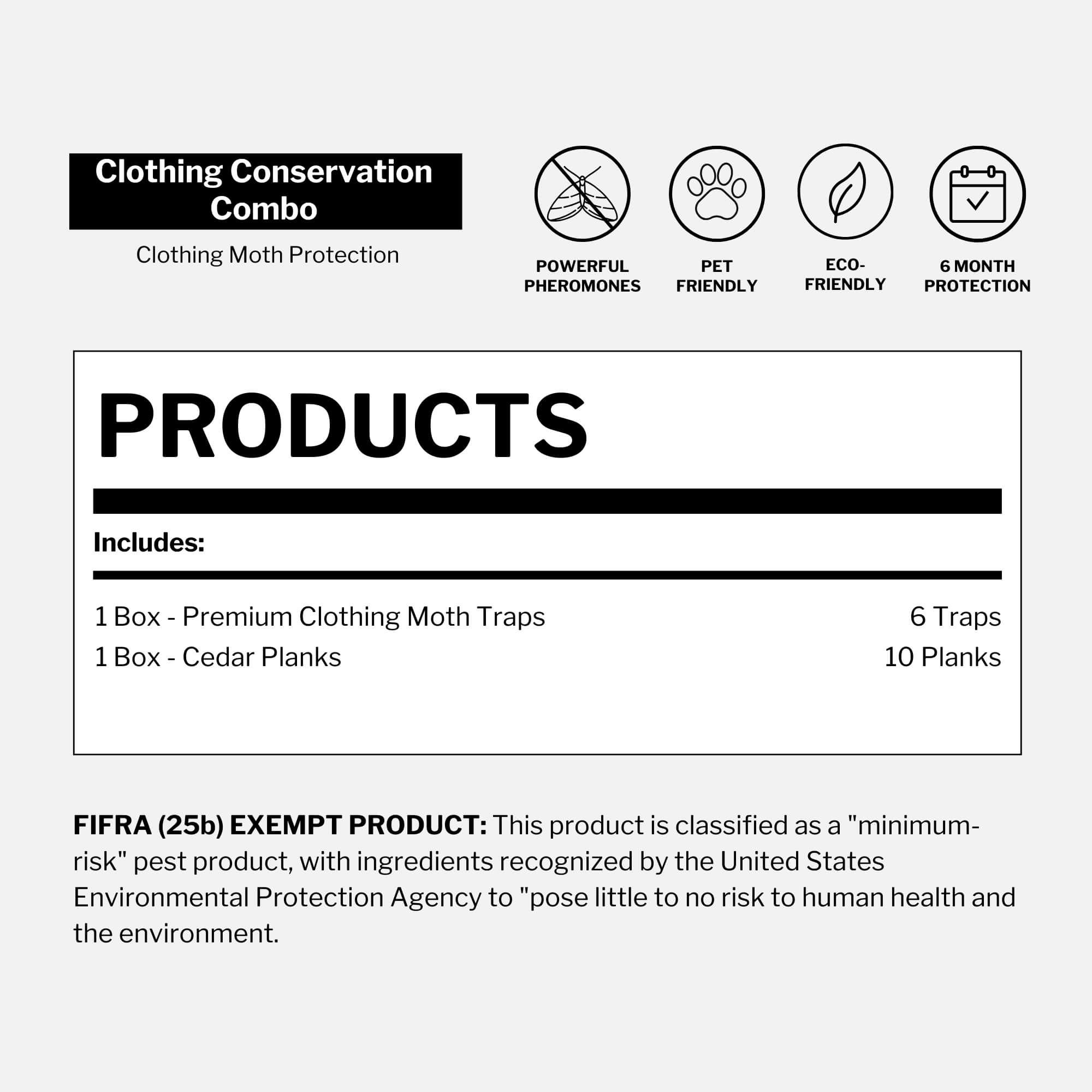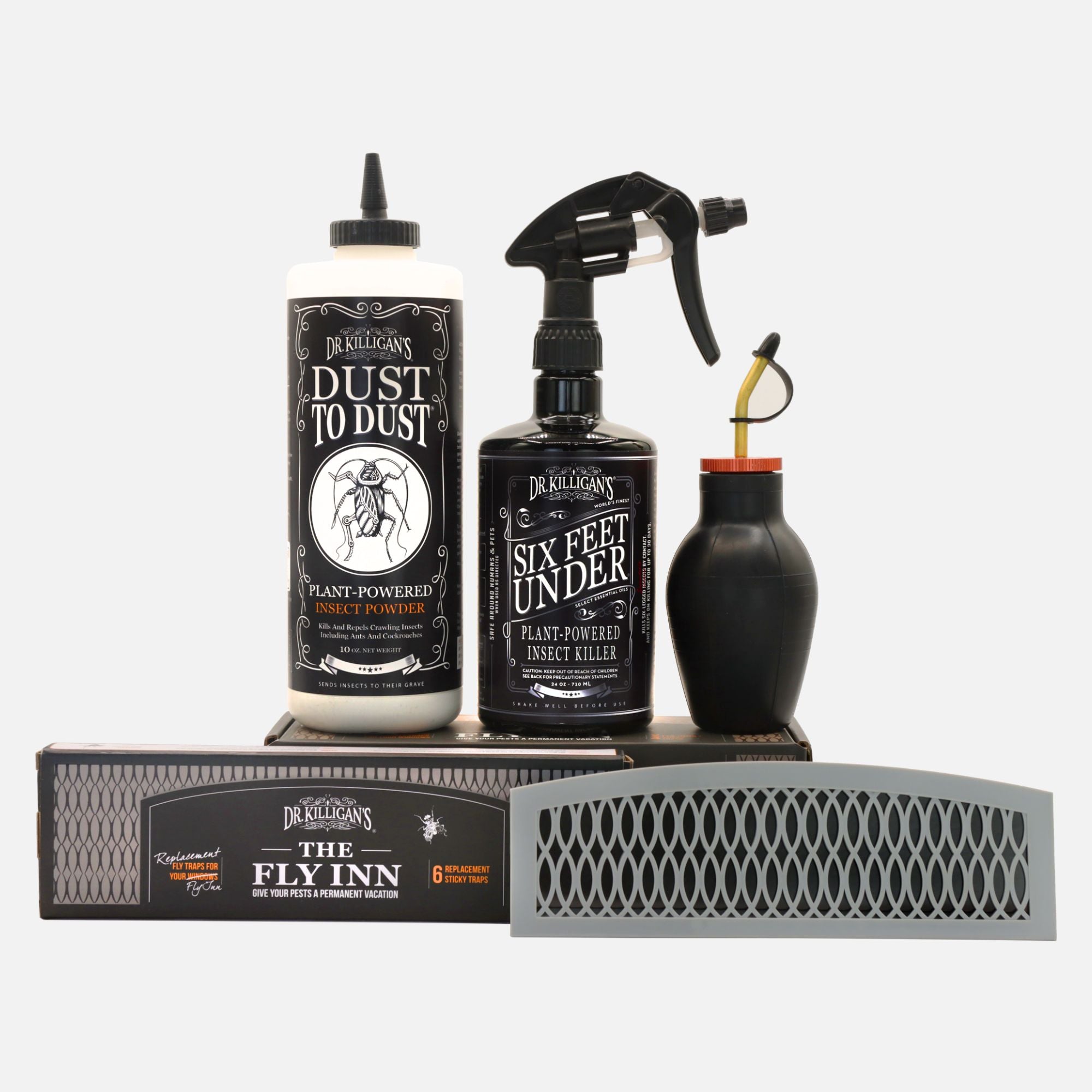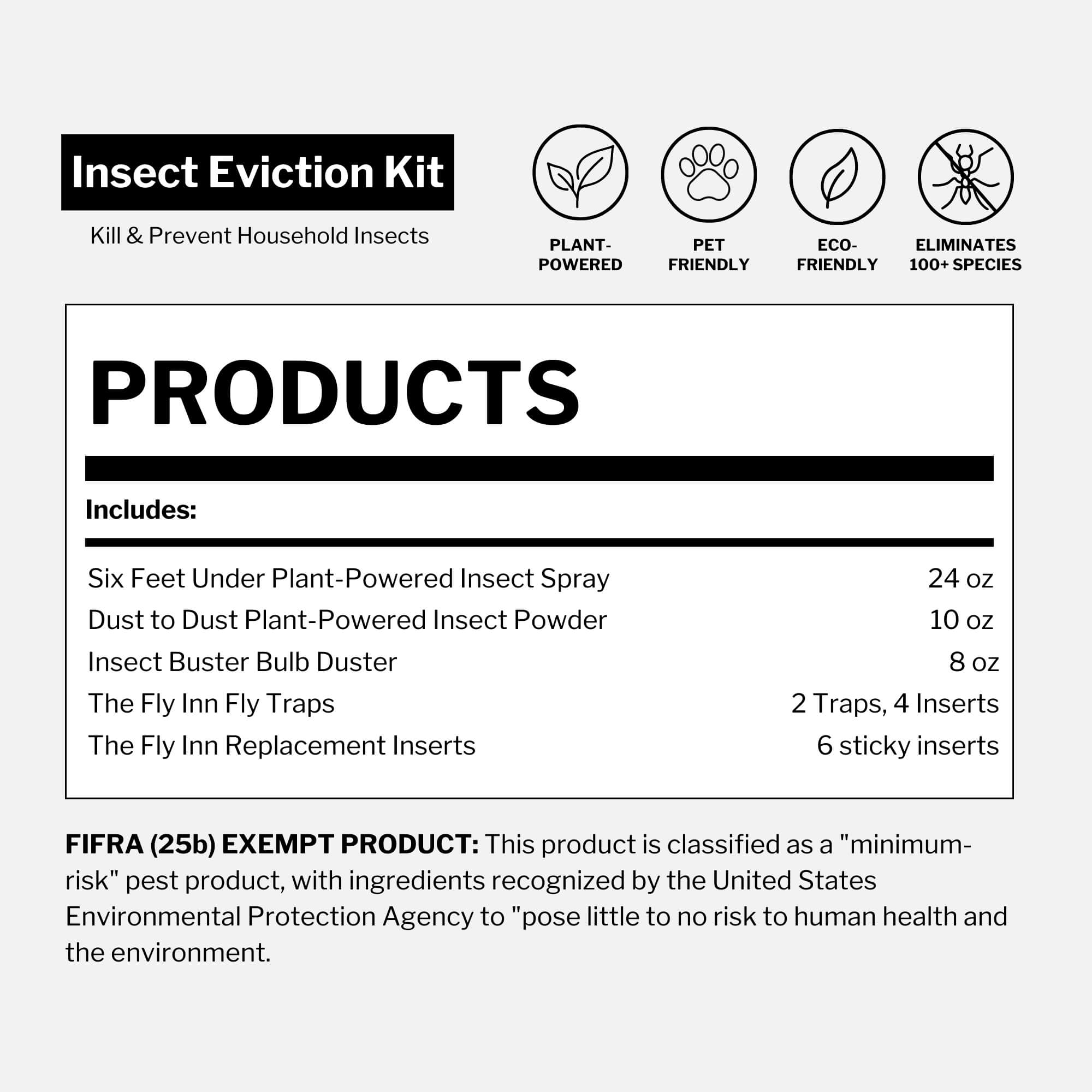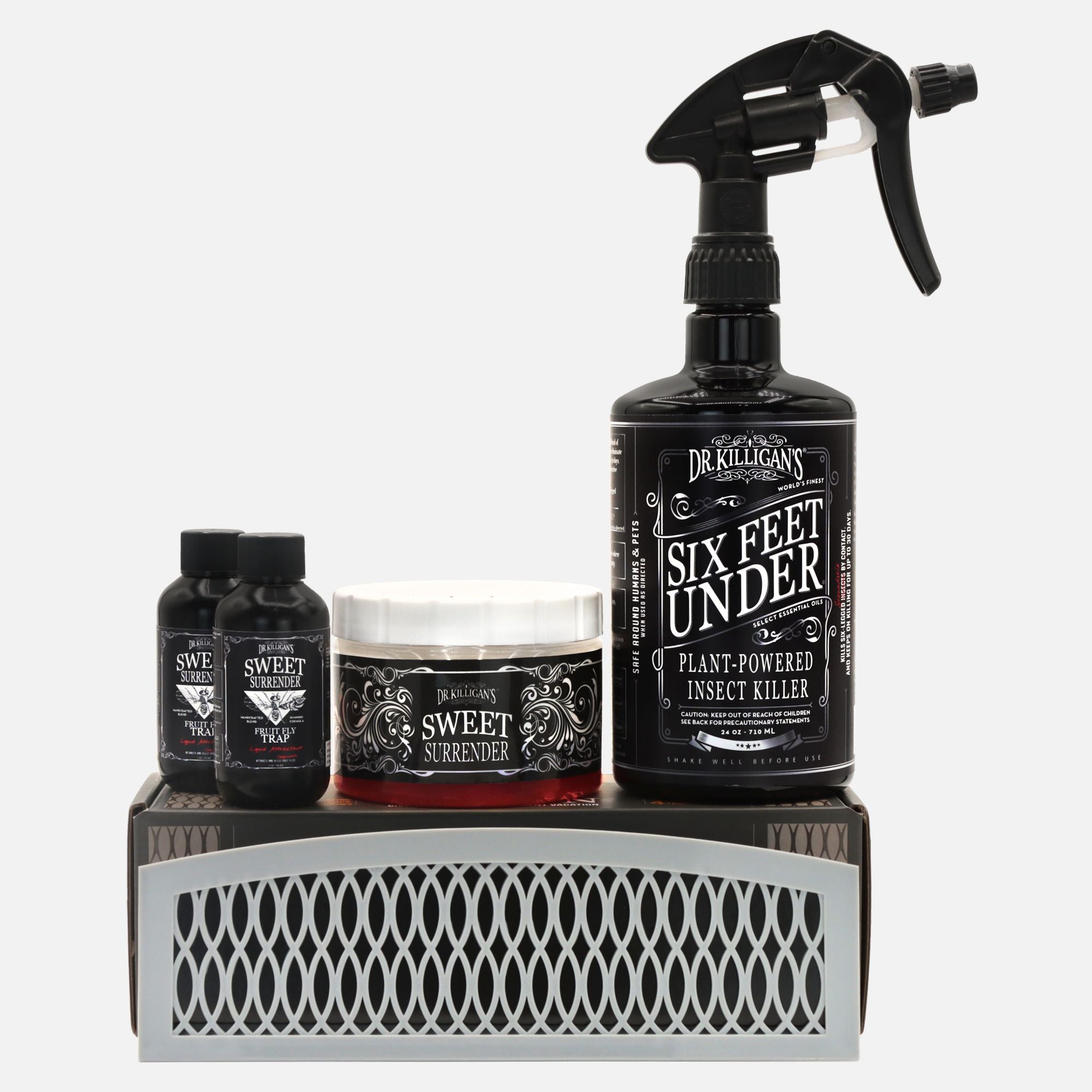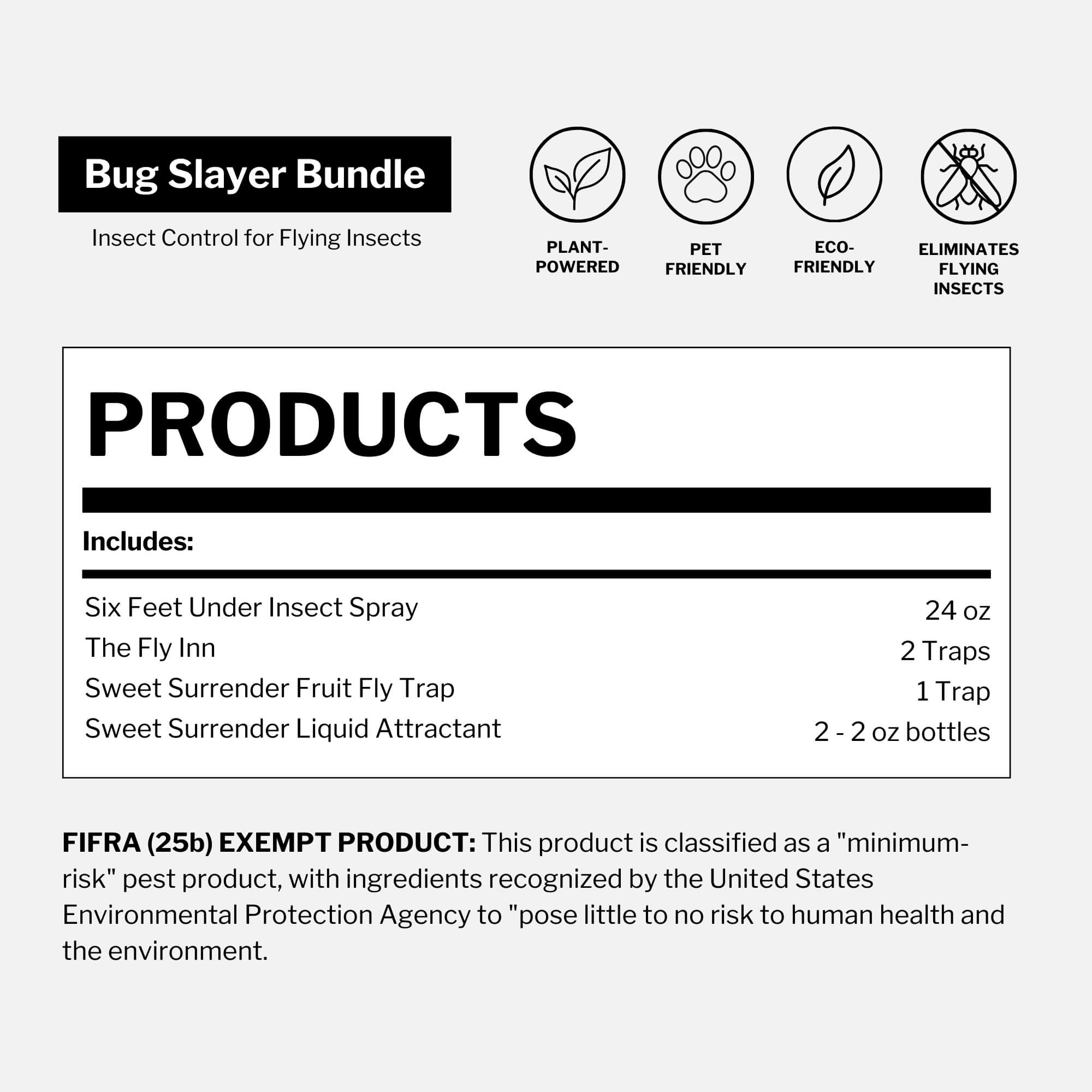Published September 27, 2022 • Updated November 6, 2025
Reviewed by Julie Miller, BA in Language Arts, Editorial Lead, Dr. Killigan’s
TL;DR: Skip harsh chemicals. Seal cracks and weather-strip doors, clear gutters and clutter, store food tightly. Use Six Feet Under for active pests, then lay Dust to Dust indoors and at thresholds for lasting control. This is non-toxic pest control for homeowners.
For years, homeowners were told that harsh chemicals were the only way to keep bugs out. The truth: you can control pests safely and effectively with a plant-powered approach. With the right plan, do it yourself pest control at home is simple and effective.

As I studied how industrial chemicals moved into everyday products, I saw how often convenience came at the cost of health. That realization shaped my mission for Dr. Killigan’s—to create solutions that are non-toxic, non-poisonous and honest about ingredients, uses and effects. I also recognized the need for exceptional care for customers. Welcome to Dr. Killigan’s.
Today, we help you do what was once left to professionals—maintain a pest-free home with simple prevention and plant-powered tools safe for your family and pets. The eight tips below will help you protect your kitchen, closets and yard without calling an exterminator. If you want home pest control without chemicals, these steps show how to prevent bugs in the house naturally.
Your core kit: Six Feet Under Plant-Powered Insect Spray for on-contact knockdown, Six Feet Under: Barricade for a perimeter shield and Dust to Dust Plant-Powered Insect Powder for cracks and crevices. These eco-friendly pest control products form a simple year-round defense.
What do I need for DIY pest prevention at home?
You can keep your house, garage and yard pest-free with eight simple focus areas. Here’s the first.
1. Do routine house inspections (find and seal entry points)
Tiny gaps invite big problems. As homes settle, hairline cracks appear in foundations and frames. Do a quick perimeter walk every 2–3 months. This is the foundation of DIY pest prevention.
What to check
- Door sweeps and weather stripping
- Window screens and frames
- Utility penetrations (cable, gas, HVAC, hose bibs)
- Foundation cracks, siding gaps, weep holes
What to do
- Knock down on sight: If you find live ants or roaches during the walk, spray Six Feet Under on contact.
- Seal: Caulk small gaps. Install or replace door sweeps.
- Treat: Lightly dust cracks and crevices with Dust to Dust using the Insect Buster (brass rod for deep seams).
- Recheck: After storms or seasonal shifts, inspect again.
Pro tip: Focus on the first 10 feet around doors, garage thresholds and under-sink plumbing—hot spots for ants, roaches and silverfish.
2. Evaluate your lawn’s foliage

Do you have tree branches, vines or shrubs touching your siding or roofline? Trim them back. These act as bridges and launch pads for spiders, ants and other crawlers—and they trap moisture, which pests love.
What to check
- Branches or vines touching siding, eaves or roof
- Shrubs pressed against foundation walls
- Mulch piled high against the house
- Dense groundcover that stays wet
- Standing water in pots, toys, birdbaths or clogged gutters
What to do
- Trim clearance: Keep branches 3–6 ft off rooflines; leave 12–18 in between plants and siding.
- Pull mulch back: Maintain 2–3 in depth and leave a 6–12 in gap from the foundation.
- Thin shrubs: Prune so air and light reach soil; raise low limbs to speed drying.
- Remove water: Empty saucers, level low spots and clear gutters so water moves away from the house.
Pro tip: After yard work, lay a light Dust to Dust band at thresholds and problem edges, then sweep a trace into cracks where you’ve seen ant or earwig activity. Reapply after heavy rain.
3. Clean your gutters (remove leaf food, remove water)
Pull out the ladder and take a look. Leaves and debris in gutters become food and shelter for mites, springtails, woodlice and other moisture-loving insects. Clogs trap water, softening fascia and roof edges—inviting carpenter ants, powderpost beetles and other wood-boring insects.
What to check
- Gutters packed with leaves or mud
- Slow or overflowing downspouts during rain
- Rotting debris at roof valleys and behind chimney flashings
- Standing water in gutters after 24 hours
What to do
- Clear channels: Scoop out debris, then flush with a hose until water runs freely.
- Fix flow: Add downspout extenders, repair sags and set a slight pitch toward outlets.
- Keep it clean: Install gutter guards or leaf screens if trees overhang the roof.
- Dry the edges: Trim back overhanging limbs to improve sun and airflow.
Pro tip: After cleaning, dust Dust to Dust lightly along exterior weep holes, soffit gaps you’ve sealed and at ground-level splash zones where overflow used to hit. Reapply after major storms.
4. Create a perimeter barrier (Six Feet Under: Barricade + Dust to Dust)
Stop crawlers before they reach the door with a two-part, plant-powered perimeter: Six Feet Under: Barricade for broad-area prevention, plus Dust to Dust for cracks and seams.
What to check

- Ant trails, earwig/silverfish activity along foundation edges
- Gaps at door frames, garage thresholds, weep holes and utility penetrations
What to do
- Spray Six Feet Under: Barricade: Apply a thin band 3–5 feet around the foundation, door frames, garage thresholds and patio edges. Its plant-based formula forms an invisible shield that deters ants, roaches, earwigs and other crawlers for weeks.
- Add Dust to Dust: Once Barricade dries, puff a light layer of Dust to Dust along cracks, corners and weep holes with the Insect Buster bulb duster.
- Reapply: Refresh both products after heavy rain, cleaning, or every 6–8 weeks for continuous coverage.
Why it works: Six Feet Under: Barricade covers large areas while Dust to Dust targets small cracks—creating a layered, non-toxic shield that blocks and repels over 100 insect species before they reach your door using natural pest control methods.
Pro tip: Apply in dry, calm conditions and keep children and pets away until the treatment area is dry.
5. Keep a tidy yard
Yard clutter gives pests exactly what they need—shelter, warmth and food. Piles of leaves, stacked firewood or overgrown brush create nesting spots for ants, spiders, beetles, termites and other insects that thrive in damp, decaying areas.
What to check
- Thick brush or clutter that gives pests shelter, warmth and food
- Piles of leaves, mulch or grass clippings near the foundation
- Firewood stacked against the house or fence
- Unused planters, buckets or toys collecting rainwater
- Debris under decks, porches or behind sheds
What to do
- Clear debris: Rake leaves, remove log piles and dispose of organic waste weekly.
- Prune plants: Keep shrubs trimmed 12–18 in from siding to maintain airflow.
- Drain water: Empty standing containers and fill low spots where water collects
- Clean structures: Sweep under decks and sheds where pests shelter.
- Relocate harborage: Move stacked firewood 20+ ft from the home and store it off the ground.
Pro tip: After cleanup, apply a thin Dust to Dust or Barricade line around patios, sheds, and foundation edges. This keeps the freshly cleared perimeter protected and inhospitable to new insect activity.
6. Use Pantry Moth Traps and Clothing Moth Traps (catch early, stop spread)
Pantry and clothing moths often arrive on groceries or fabrics and spread quickly. Early detection is the best non-toxic pest control for homeowners.
What to check

-
Webbing in flour or grains, pinholes in packages, small beige moths at dusk
- Thinning spots or holes in wool, silk or cashmere; sand-like frass on shelves
- Unsealed bulk grains; open bird seed; off-season sweaters stored in boxes
What to do
- Set traps: Place Dr. Killigan’s Premium Pantry Moth Traps on upper pantry shelves, away from drafts.
- Inspect and discard: Check dry goods for webbing or larvae; discard any infested items.
- Store securely: Transfer fresh staples to airtight glass or stainless-steel containers.
- Clean thoroughly: Wipe shelves with hot, soapy water and vacuum cracks or corners before restocking.
- Protect clothing: In closets, place Dr. Killigan’s Premium Clothing Moth Traps at shoulder height.
- Maintain fabrics: Launder or dry-clean vulnerable garments and store them in sealed bins or breathable garment bags.
- Vacuum often: Clean under furniture and along baseboards where larvae hide.
Shelf life: Open traps work for about 3 months. Unopened, they keep up to 3 years from manufacture.
Pro tip: Replace traps every three months and keep them in place for one full lifecycle after your last catch. For wool storage, add Cedar Planks Clothes Moth Repellent or Cedar Pest Repellent Canisters for extra deterrence.
7. Store pet food so it doesn't attract pests
Open bags of kibble are pest magnets. Treat pet food like pantry food: sealed, clean, off the floor. This is a core step in how to prevent bugs in the house naturally.
What to check
- Open paper bags or thin plastic liners
- Spills around bowls, bins or scoops
- Storage on the floor or near doors where ants and roaches trail
What to do
- Seal storage: Transfer pet food to airtight bins (BPA-free plastic or stainless steel with tight lids).
- Elevate bins: Keep containers off the floor and away from human food areas.
- Scoop smart: Use a dedicated scoop and wipe bin rims after each use.
- Stage smart: Store bulk food in a cool closet or garage; keep only a small container indoors.
- Clean daily: Wipe feeding zones and sweep crumbs after meals.
Pro tip: Rinse pet bowls nightly. After cleanup, dust a whisper-thin line of Dust to Dust along baseboards behind bowls to deter ants and roaches between meals.
8. Keep your natural pest control supplies ready (DIY home defense kit)
Small infestations grow quickly, but with the right tools on hand, you can stop pests before they spread. A few core plant-powered products keep you ready for anything from fruit flies to roaches.
What to check

- Missing or low supplies of sprays, dusts and traps
- Crumbs or debris behind appliances and inside cabinets
- Signs of activity around window sills, pantries and baseboards
- Expired or saturated trap inserts—replace every few months
What to do
- Six Feet Under (on-contact): Keep one in the kitchen and one in the garage. This fast-acting, non-toxic spray kills ants, flies, moths, roaches, silverfish and earwigs on contact. Safe for use around kids, pets and food when used as directed.
- Dust to Dust: For long-term protection, lightly dust baseboards, under sinks, behind appliances and into cracks using the Insect Buster. The ultra-fine silica and essential oils dehydrate and repel over 100 insect species.
- Sweet Surrender Fruit Fly Trap: Add two ounces of liquid attractant to the reusable container and place near fruit or compost. It's vinegar, sucrose and citrus blend lure and trap fruit flies naturally.
- The Fly Inn Flying Insect Traps: Place in bright windows where flying insects gather. Each kit includes traps and sticky inserts to quietly catch flies and gnats without sprays or fumes.
Pro tip: Build a pest-prep basket under your kitchen sink or in the garage—stock it with one of each essential. Refresh Dust to Dust after cleaning, swap trap inserts every 2–3 months, and reapply Six Feet Under at the first sign of activity to stay consistently protected year-round.
Final word on DIY pest prevention and natural insect control products
A pest-free home doesn’t need toxic chemicals or monthly visits—it takes awareness, consistency and the right tools.
According to the U.S. Environmental Protection Agency (EPA), homeowners can prevent most pest problems through simple maintenance and non-chemical methods—removing food, water and shelter sources.
By sealing cracks, trimming foliage, keeping food sealed and maintaining your perimeter with plant-powered solutions, you can prevent most infestations before they start. With consistent DIY pest prevention, you can do home pest control without chemicals and keep your space safe around pets and family.
At Dr. Killigan’s, our mission is simple: restore peace of mind with pest control that’s powerful yet kind to people, pets and the planet. Each formula, from Six Feet Under to Dust to Dust, is designed for performance, safety and transparency so you can handle pests naturally and confidently.
Remember: prevention is protection. Inspect your space seasonally, apply Dust to Dust or Barricade around entry points and keep Six Feet Under within reach for on-contact defense. Together, these steps create a home that’s comfortable, chemical-free and confidently under your control.
Pro tip: Schedule a quarterly “home health check”—walk your perimeter, refresh Dust to Dust and tidy storage areas to stay ahead of pests.





